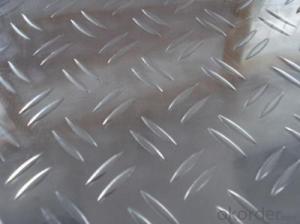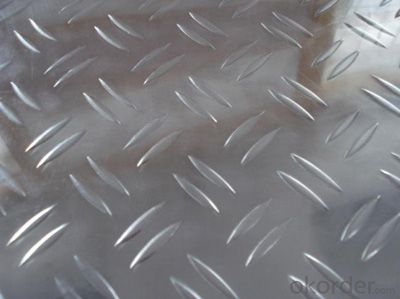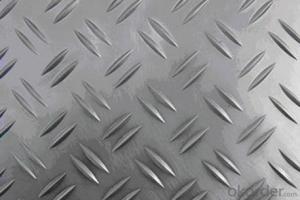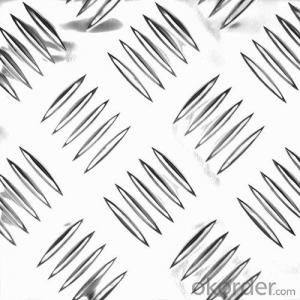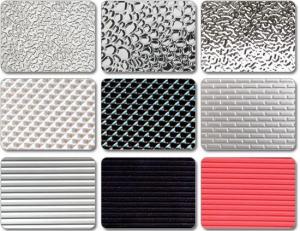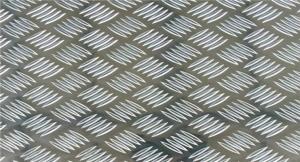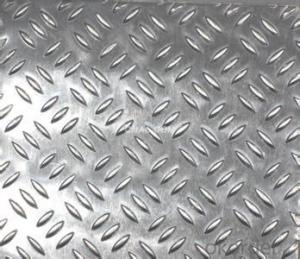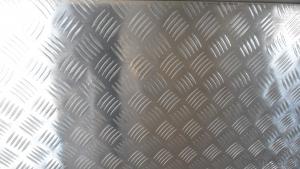Coil of Aluminum Checkered Sheet - Two Bars
- Loading Port:
- China Main Port
- Payment Terms:
- TT OR LC
- Min Order Qty:
- -
- Supply Capability:
- -
OKorder Service Pledge
OKorder Financial Service
You Might Also Like
Product Description:
1. Specifications of Aluminum Checkered Sheet
| MAIN SPECIFICATION OF ALUMINUM CHECKERED SHEET | |
| Alloy | AA1XXX (AA1050, AA1060, AA1070, AA1100 etc.) |
| AA3XXX (AA3003, AA3004, AA3005, AA3105 etc.) | |
| AA5XXX(AA5052) | |
| | |
| Temper | H14,H18,H24, H26, H32 |
| Thickness | 0.2mm-100mm |
| Width | 30mm-1700mm |
| Standard | GB/T 3880-2006 |
| Special specification is available on customer's requirement | |
2. Usage/Applications of Aluminum Checkered Sheet
The embossed aluminum sheet are widely used for decorative purposes in construction, packing and appliance. It is also very commonly used for anti-splippery purposes in vehicles and public places.
3. Packing & Delivery of Aluminum Checkered Sheet
Packaging: Seaworth package
Shipment: The goods will be delivered in not more than 40 days after getting the buyer's payment.
- Q: Aluminum metal is oxidized in aqueous base with water serving as the oxidizing agent. Al(s) + H2O(1) → Al(OH)4- + H2(g) (basic solution) Write a balanced equation for this reaction in basic solution.
- Aluminium is an alloy not a metal.
- Q: Can aluminum coils be used in cryogenic applications?
- Indeed, cryogenic applications can utilize aluminum coils. Highly regarded for its remarkable thermal conductivity, aluminum proves to be an appropriate substance for heat transfer in environments with low temperatures. Moreover, aluminum exhibits a minimal coefficient of thermal expansion, enabling it to endure the drastic temperature fluctuations inherent in cryogenic applications while avoiding notable alterations in dimensions. Nevertheless, it is important to acknowledge that aluminum coils might necessitate specific design or treatment to guarantee their resilience against exceedingly frigid temperatures and mitigate any potential concerns like brittleness or embrittlement.
- Q: Are aluminum coils suitable for medical equipment applications?
- Yes, aluminum coils can be suitable for medical equipment applications. Aluminum is lightweight, corrosion-resistant, and has excellent thermal conductivity properties. These factors make it an ideal material for various medical equipment applications, such as cooling systems, heat exchangers, and MRI coils. Additionally, aluminum coils can be easily formed and fabricated into complex shapes, allowing for customization based on the specific requirements of the medical equipment. However, it is important to note that the suitability of aluminum coils for medical equipment applications may also depend on other factors such as the specific medical device, regulatory requirements, and industry standards.
- Q: I know aluminum has gone up in price. I know very little about gutter material. Durability, leaf guards, etc. I am on a limited income, and need the most and best for my few bucks. Thanks Lee
- ALUMINUM!!!!!!!!!!!!!!!!!!
- Q: What are the common sizes and dimensions of aluminum coils?
- The common sizes and dimensions of aluminum coils vary depending on the specific application and industry requirements. However, some commonly used sizes include widths ranging from 2 inches to 60 inches and thicknesses ranging from 0.008 inches to 0.25 inches. The length of the coils can vary as well, depending on the customer's needs.
- Q: How are aluminum coils processed for specific thicknesses?
- Aluminum coils are processed for specific thicknesses through a combination of cold rolling and annealing processes. Initially, the coils go through a series of cold rolling mills that gradually reduce their thickness and improve their surface quality. This is achieved by passing the coils through a set of rollers that exert pressure and compress the aluminum, resulting in a thinner and more uniform sheet. After cold rolling, the coils undergo an annealing process, where they are heated and then slowly cooled to enhance their mechanical properties and eliminate any residual stresses. This combination of cold rolling and annealing allows for precise control over the thickness of the aluminum coils, catering to the specific requirements of various industries.
- Q: How are aluminum coils used in the production of architectural structures?
- Aluminum coils are used in the production of architectural structures as they provide a lightweight and durable material for various applications. These coils can be formed into different shapes and sizes to create components like siding, roofing, and window frames. The versatility and corrosion resistance of aluminum make it an ideal choice for architectural projects, ensuring long-lasting and aesthetically pleasing structures.
- Q: I HEARD THAT ALUMINUM POWDER TIGHTEN YOUR VAGINA BUT WHERE DO I BUY IT AND HAVE ANY ONE HEARD OF BEYDARY PILLS, I HEARD THEY TIGHTEN YOUR VAGINA ALSO AND WHERE CAN I BUY THEM
- try leaving it alone for awhile
- Q: Are aluminum coils compatible with other materials?
- Yes, aluminum coils are compatible with other materials. Aluminum is a versatile and widely used material that can be easily integrated with various other materials in different applications. For example, aluminum coils can be used in conjunction with copper tubing in air conditioning and refrigeration systems to enhance heat transfer efficiency. Additionally, aluminum coils can be coated or laminated with other materials such as polymers or paints to provide additional protection against corrosion, improve aesthetics, or enhance specific performance characteristics. Therefore, aluminum coils offer compatibility with a range of materials, making them suitable for diverse applications in industries such as construction, automotive, aerospace, and more.
- Q: This question asks about the impact of aluminum coils on food quality, considering possible effects on taste, safety, and preservation.
- <p>Aluminum coils, when used in cooking or food packaging, can potentially affect the quality of food. If aluminum leaches into the food, it may alter the taste and could pose health risks due to aluminum's neurotoxic properties. However, modern food-grade aluminum coils are coated or anodized to prevent such leaching, ensuring food safety. They are also used in heat transfer for cooking, which can improve the efficiency and evenness of cooking, thus enhancing food quality. It's crucial to use high-quality, food-safe aluminum coils to avoid any negative impact on food quality and safety.</p>
Send your message to us
Coil of Aluminum Checkered Sheet - Two Bars
- Loading Port:
- China Main Port
- Payment Terms:
- TT OR LC
- Min Order Qty:
- -
- Supply Capability:
- -
OKorder Service Pledge
OKorder Financial Service
Similar products
Hot products
Hot Searches
Related keywords
